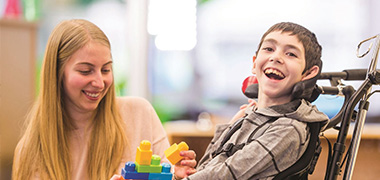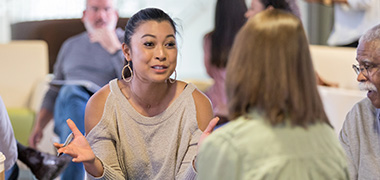What can you do with a Certificate IV in Disability?
Written by Jodie Magrath
12th November 2020
A Certificate IV in Disability will give you the practical skills and knowledge you need to support people who have a disability. Whether you’re assisting people in their own home, working in a facility catering for people with disabilities or are employed by a disability service provider, this qualification will show you how to help your clients reach their goals. You might focus on providing social opportunities for people with a disability or getting your clients more involved in their community.
The Certificate IV in Disability covers a range of topics to help you succeed in various disability service careers. You’ll learn how to provide individualised support and explore behaviour management strategies. This course looks at ways to empower people with a disability in their own lives and promotes participation and inclusion in social and community events. The Certificate IV in Disability includes a work placement so you’ll get some real world experience in the disability sector.
Working in disability services can be extremely rewarding. If you enjoy forming strong relationships with clients and helping them become more independent, this could be a great career pathway for you. Supporting people with a disability requires patience and understanding and you’ll need to be a good communicator. It’s important that you’re flexible and able to adapt to the needs of individual clients.
A Certificate IV in Disability is an ideal course of study for the following careers:
Disability Service Officer
A Disability Service Officer works with people who have a disability to make sure they are getting the support they need. They will assess the needs of their clients and help them access available services. They might focus on a particular area such as training or employment and they’ll usually come up with a program that will best serve their client’s needs. Disability Service Officers liaise with families, employers and other service providers to monitor the success of support programs.Residential Care Officer
A Residential Care Officer leads a team of personal support workers in a residential facility such as a group home for people with a disability or respite accommodation. They will provide care for residents at the facility and assist with jobs like feeding, bathing and dressing. Residential Care Officers also help their clients to manage tasks like cleaning or cooking and may organise social events and take residents out into the community. They may have to manage other staff members and organise training and rosters.Diversional Therapist
A Diversional Therapist organises recreational activities and social events for people with disabilities or other special needs. They often work in a residential care facility but they might also work with people who otherwise find it difficult to access activities on their own. Diversional Therapists may work with their clients on programs addressing physical issues such as exercise and healthy movement or they might organise activities such as excursions or dance sessions for social and community participation. They might work with individual clients or take a small group activity.Higher education pathways
A Certificate IV in Disability is a great qualification if you’re considering a career in disability services. You may also choose to specialise your skills with a Certificate III in Individual Support (Disability) which provides more insight on giving individual care to clients or a Certificate IV in Allied Health Assistance which will explore the practical skills needed to help other health professionals deliver services to people with a disability. A Certificate IV in Leisure and Health may also be suitable if you enjoy that aspect of disability care.
You might also choose to take your studies further with a university degree. A qualification such as the Bachelor of Disability and Developmental Education or a Bachelor of Human Services will provide you with more specialised knowledge and allow you to be employed in a wider range of positions. You may be able to use a Certificate IV in Disability as a pathway to these qualifications.
Getting started
Before you enrol in a Certificate IV in Disability it’s important that you get information from a range of course providers. There is usually some variation in the way they deliver their studies so make sure you get all the details so you can find the right course for you. Find out about the duration of the course, costs, any prerequisites and the content the course will cover. The Certificate IV in Disability may be offered online or on campus.







